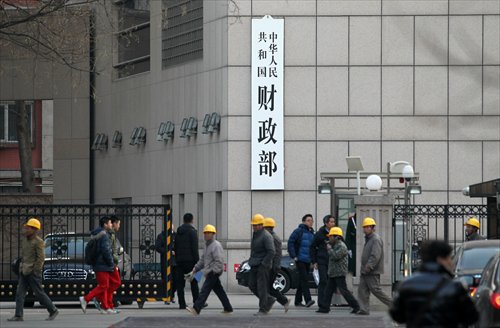China denies report on AIIB veto power
Bank to be based on collective negotiation: experts

People walk past the Ministry of Finance on March 5. Photo: CFP
China's vice finance minister said Wednesday that the assumption that "China had either sought or given up veto power in the Asian Infrastructure Investment Bank (AIIB)" is untrue, and the bank's decision-making mechanism and share distribution is still under deliberation.
"The AIIB will be an open, transparent and highly efficient multilateral institution. With an increasing number of members, every member's share will be diluted," Vice Finance Minister Shi Yaobin said in a statement posted on the ministry's website.
Shi's comment came after a report Tuesday by the Wall Street Journal, which said China had offered to forgo veto power at the AIIB, a move that has been a critical factor in attracting major European countries to join the bank.
Experts said Shi's statement showed China's desire to take an innovative approach to governance issues in multilateral institutions without overstressing the power of the largest shareholder.
"Having veto power could empower China in deciding on the AIIB's investment projects and minimizing potential risks, but such a move would go against the bank's principles, which stress negotiations among all members," Tu Xinquan, a professor at the University of International Business and Economics in Beijing, told the Global Times Wednesday.
There have long been complaints that the US has the power to veto important decisions at the IMF. The AIIB, however, will seek to make decisions on the basis of unanimous agreement rather than voting share, Jin Liqun, secretary-general of the Multilateral Interim Secretariat for Establishing the AIIB, told a forum held Sunday in Beijing.
"China has made the right decision not to seek veto power at the AIIB, because if it did so, it would repeat the US approach of seeking to dominate the IMF," Zhao Changhui, a senior research fellow with the Chongyang Institute for Financial Studies at the Renmin University of China, told the Global Times Wednesday.
"But being the largest shareholder in the bank, China is also unlikely to totally give up its influence in it," Zhao said.
A total of 35 economies have so far either joined the bank or announced their intention to join it as founding members.
According to Shi, the final number of AIIB founding members will be verified as early as April 15, about two weeks after the application deadline of March 31. Countries that apply to join after the deadline will be considered regular members.
Shi reiterated in the statement that all countries and regions are welcome to join the AIIB.
"We have been communicating with Australia, South Korea, Japan and the US during the AIIB's establishment process," he said. "China welcomes all economies to join, and will respect their decision on whether or when to join."
Australian Foreign Minister Julie Bishop said Wednesday that the Australian government is still going through the process of examining "governance issues" at the AIIB, and there is "quite a way to go" before Australia can sign up to join the organization, even though the March 31 deadline is close, the Xinhua News Agency reported Wednesday.
"The current signs suggest that Australia and South Korea are likely to join the AIIB, while the other two are still pending," Tu said.
Shi noted that China is willing to strengthen communications with all countries under bilateral or multilateral economic dialogue mechanisms, and also to cooperate with existing multilateral institutions such as the World Bank and the Asian Development Bank.
Indonesia's Finance Minister Bambang Brodjonegoro said on Monday that his country hoped the AIIB's headquarters might be in Jakarta, according to Reuters.
But Shi's statement said the AIIB, which is scheduled to be launched within the year, will have its headquarters in Beijing, in accordance with a memorandum of understanding on establishing the bank signed by 21 Asian members in October 2014.
Whether regional AIIB centers will be launched in other countries and regions will be decided by its business operation in the future and through negotiations, Shi said.